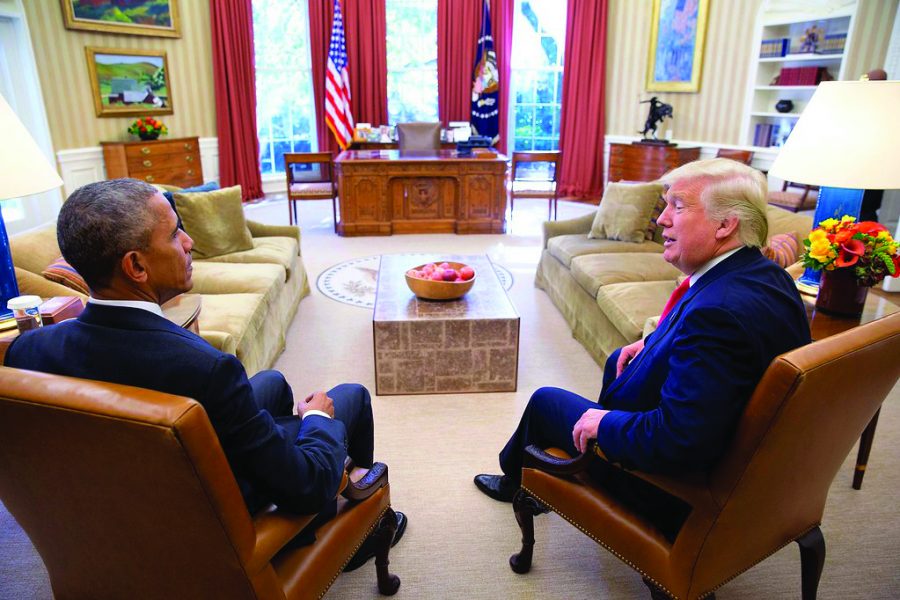Opinion | Trump’s economy is an extension of Obama’s
January 14, 2020
When under scrutiny, President Donald Trump often champions his flourishing economy. In fact, falling back on his economic achievements, which Trump claims have led to the “greatest” economy in American history, has essentially served as Trump’s insulation from the allegations and controversies that have plagued his first term.
While Trump’s assertion that the American economy is healthy and thriving is accurate–the U.S. unemployment rate fell to a 50-year low in October of 2019–Trump’s accomplishments lack crucial context, particularly the invaluable contributions of former president Barack Obama.
Trump’s readily apparent vendetta against Obama manifested itself from the moment the latter took office. In his relentless pursuit to discredit Obama, Trump spearheaded the birtherism rumors, contending that Obama was a traitorous Muslim terrorist hailing from Kenya.
His now-ironic tweets speculating that Obama would initiate a war with Iran in order to engender support for a re-election bid cast Obama as a shameless politician willing to sacrifice American lives for the sake of elongating his political career.
Trump even erected an entire campaign centered around dismantling Obama’s landmark achievements, particularly honing in on the Affordable Care Act.
But Trump’s most curious quarrel with Obama has been his pointed omission of the series of economic contributions that helped counteract the worst American recession since the Great Depression.
You see, at the end of George Bush’s final fiscal year, the U.S. unemployment rate rested at an unsettling 9.9% (it’s important to note that a president’s final fiscal year ends approximately ten months after the succeeding president assumes office). Furthermore, GDP growth labored to a measly 0.5% growth during Bush’s second term, a full 2.5% slower than the 3% growth that defined Bush’s first term. In other words, Obama inherited a mess.
However, by the end of Obama’s final fiscal year, which ended on Sept. 30, 2017, unemployment sat at approximately 4.2%. During his eight years in office, Obama lowered the U.S. unemployment rate by more than half relative to what he inherited.
Since then, the Trump administration has lowered unemployment by another 0.6% to the current 3.6% rate, allowing Trump to claim credit for lowering the unemployment rate to the aforementioned 50-year low. However, such a claim rests on a foundation of technicalities and deliberate omissions.
To put the economic accomplishments of both Trump and Obama into greater perspective, Obama cut unemployment by approximately 58% over eight fiscal years relative to what he inherited. Since that time, Trump has lowered the unemployment by another 14%.
But the question remains: how can we attribute the clear successes in faltering unemployment rates to the administration responsible for a 14% reduction but not the administration that not only oversaw a 58% decrease in unemployment under their watch but also did so while inheriting a collapsing economy? Simply put: we can’t responsibly do so. Doing so would be the equivalent of paying $14 of a shared $72 bill yet being expected to thank the friend who paid the remaining $58 to express gratitude.
To further underscore how Trump’s economic successes are a linear extension of Obama’s, we can examine quarterly GDP growth, a figure which measures how quickly or slowly the economy is growing. Between 2011 and 2019, four of the five highest quarterly GDP increases occurred under Obama: the fourth quarter of 2011 (4.7%), the first quarter of 2013 (3.6%) and quarters two and three of 2014 (5.5% and 5.0%, respectively).
Since the beginning of Trump’s first fiscal year in Sept. of 2017, the highest quarterly GDP growth was the 4.2% featured in the second quarter of 2018. The second highest was the 3.5% growth in the fourth quarter of 2017.
Of course, referencing these statistics is not meant to dismiss or diminish Trump’s economic contributions. In fact, there are a plethora of achievements that are unique to Trump–business and consumer confidence surged after Trump’s election and have remained intact; wages have increased at rates unseen since the onset of the Great Recession; job creation in the manufacturing field experienced a healthy if volatile increase following Trump’s tax rates, though such growth has since stagnated.
Instead, highlighting these statistics is meant to acknowledge Obama’s tireless effort to counteract the harrowing trajectory of the U.S. economy he inherited. And that’s how politics are supposed to work in a healthy nation; one president succeeds his predecessor and improves upon the positives enacted by the departing administration.
Unfortunately, America has devolved into a pattern of shameless identity politics, with each side so married to his or her political party that they refuse to acknowledge or celebrate the contributions of the opposing faction. The divisions created by unmended political fissures have infected our great nation. But fortunately for keen-eyed readers, opinions don’t alter facts.






